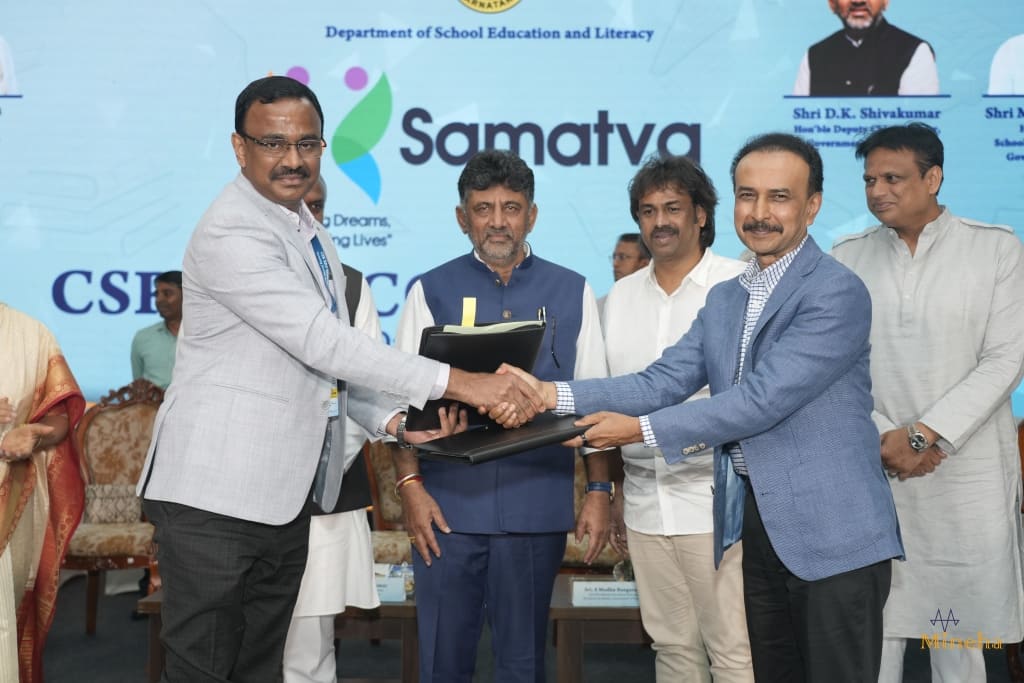Bengaluru, India: United Way Bengaluru (UWBe) as a part of the Department of School Education and Literacy (DoSE&L), the Government of Karnataka’s Samatva initiative signed a Memorandum of Understanding (MoU) with the department. This partnership aims to enhance the education landscape in peri-urban and rural areas across the state, with a particular focus on strengthening government schools.
Under the initiative called Samatva, the Department of School Education and Literacy (DoSE&L), the Government of Karnataka, envisions strengthening and transforming government schools into model institutions. These Karnataka Model Schools have been conceptualized to provide quality education to students from Lower KG (LKG) to Pre-University College (PUC) levels, all within a single campus. With upgraded infrastructure, facilities, and learning initiatives, the goal is to improve the learning and well-being of students. To achieve this, the DoSE&L has invited NGO and CSR partners for strategic collaboration.
Rajesh Krishnan, CEO of United Way Bengaluru, stated, “The partnership with the government represents a path-breaking initiative aimed at transforming the educational landscape for students from kindergarten to pre-university college. Together, with our CSR partners and government stakeholders, we are dedicated to creating a nurturing learning environment, ensuring access to quality education and essential resources, particularly for the growth and development of children from marginalized communities.”
Since 2008, UWBe has been actively working with government and government-aided schools. With the support of CSR partners, it recently strengthened the Karnataka Public School in Nandagudi, Hoskote, Bengaluru. This school serves approximately 1,200 children, primarily from families of migrant and wage labourers. Key enhancements under this initiative included the construction of new classrooms and renovation of existing infrastructure, upgrading of toilet facilities, setting up STEM labs and science laboratories, and the installation of solar panels to promote sustainability and energy efficiency. Additionally, teachers have received training in STEM education, enabling them to integrate innovative teaching methods into their classrooms.
The modern laboratories have attracted more students to enrol in science disciplines, significantly benefiting 250 PUC students at KPS Nandagudi. Previously, these students faced challenges due to inadequate lab facilities, often having to travel over 20 kilometres to take practical exams at another centre.
United Way Bengaluru will continue to expand its efforts under the Samatva initiative. This will include setting up STEM, digital classrooms, and English Labs in more than 100 schools and strengthening school infrastructure, including integrating WASH elements based on identified needs. UWBe will also focus on teachers’ skills development and training them on reproductive health and gender sensitivity.
UWBe is an NGO focused on social issues that seek immediate and long-term attention. United Way Bengaluru marked a significant milestone this year as it completed its 15-year journey. As a part of the global network, United Way Worldwide, the largest network of non-profit organizations with 1,100 chapters in 37 countries, United Way Bengaluru carries a global image with a ‘local heart’ committed to creating meaningful change in the lives of the local communities. True to the organization’s mission “To improve lives by mobilizing the caring power of communities around the world”, UWBe catalyzes unified efforts from corporates, civic bodies, and citizen associations to bring about visible and sustainable change in the lives of the communities. The organization works in four key areas – environment, education, healthcare, and rural development.
Disclaimer: This media release is auto-generated. The CSR Journal is not responsible for the content.

